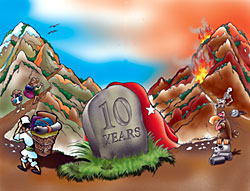|
|
A newly-independent media reported the scandals in all their gory details and indirectly helped spread cynicism about politicians and tarred democracy itself.
To be sure, at the grassroots political freedom made elected officials accountable. For the first time, rural Nepalis felt in control and demanded basic services.
But the Maoist wing of the CPN got tired of waiting for democracy to iron out its kinks and took the shortcut of armed struggle. Rural Nepal was ripe for revolution because of the neglect and indifference of Kathmandu which democracy had failed to address.
By 1998 even the Maoists were surprised by how rapidly their revolution had spread. It wasn't just because of their tactics but because the state was so fractious and weak. They were following Mao by the book, surrounding the cities from the villages.
"They tried to terrorise the state by destroying the rural infrastructure but it only hurt the innocent rural poor," recalls economist Pitambar Sharma, "the rulers had never cared for the villages so they weren't bothered." Politicians in Kathmandu engrossed in their petty bickering ignored the problem until it was too late.
Ten years of war set back development and wrecked the economy. Tourist arrivals in 2005 were less than half the 500,000 who visited Nepal in 1998, investment dwindled, industries closed down and in the past 10 years one million Nepalis have left to work in the Gulf and Malaysia. The economy which was growing at six percent in 1996 is down to 1.5 percent.
But the conflict has forced Nepalis to examine the structural problems of exclusion and unaccountability in their society. Says former minister Harka Gurung: "The past 10 years have at least brought the socio-political roots of the crisis to the surface. I take that as a positive development."
Theoretically, then, finding a negotiated solution to the conflict should also allow Nepalis to address its root causes. And the mechanism for that could be voting an electoral college to draft a new constitution, which is a key Maoist demand.
Says Gurung: "A constituent assembly is the only antidote to the problems raked up by the past ten years of conflict and to do so King Gyanendra must hand power back to the people just like his brother did in 1990."
The slew of high-profile media interviews in the past week may mean the Maoists want a political exit but need something to show for the past 10 years. In the past they have preceded every peace overture with a major strike to improve their bargaining position and that seems to be their present strategy.
"The Maoists know they have reached a deadend with violence, so they have two options: talks or irrelevance," concludes former Maoist commander Puskar Gautam. "We should be satisfied if the last 10 years bring at least some changes in the way Nepal is ruled."
For detailed analysis by people quoted in this article see Himal Khabarparika, 13-27 February.



